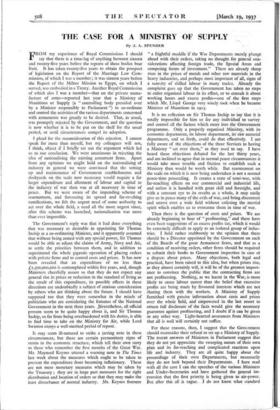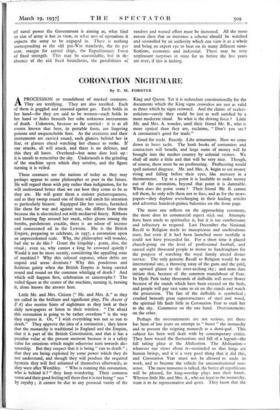THE CASE FOR A MINISTRY OF SUPPLY
By J. A. SPENDER
FROM my experience of Royal Commissions I should say that there is a time-lag of anything between sixteen and twenty-five years before the reports of these bodies bear fruit. It has taken twenty-five years to obtain the prospect of legislation on the Report of the Marriage Law Com- mission, of which I was a member; it was sixteen years before the Report of the Milner Mission to Egypt, on which I served, was embodied in a Treaty. Another Royal Commission of which also I was a member—that on the private manu- facture of arms—reported last year that a Ministry of Munitions or. Supply (a "controlling body presided over by a Minister responsible to Parliament ") to co-ordinate and control the activities of the various departments concerned with armaments was greatly to be desired. That, as usual, was promptly rejected by the Government, and the question is now whether it is to be put on the shelf for the usual period, or until circumstances compel its adoption.
I plead for the reconsideration of this rejection. I cannot speak for more than myself, but my colleagues will not, I think, object if. I briefly set out the argument which led us to our conclusion. We were unanimous in rejecting the idea of nationalising the existing armament firms. Apart from any opinions we might hold on the nationalising of industry in general we were convinced that the setting up and maintenance of Government establishments and dockyards on the scale now necessary would require a far larger expenditure and allotment of labour and capital to the industry of war than was at all necessary in time of peace. But we were aware of the impending scheme of rearmament, and foreseeing its spread and far-reaching ramifications, we felt the urgent need of some authority to act over the whole field, a need all the more urgent since, after this scheme was launched, nationalisation was more than ever impossible.
The Government's reply was that it had done everything that was necessary or desirable in appointing Sir Thomas Inskip as a co-ordinating Minister, and it apparently assumed that without being armed with any special power, Sir Thomas would be able to adjust the claims of Army, Navy and Air, to settle, the priorities between them, and in addition to superintend the whole gigantic operation of placing orders with private firms and to control costs and prices. It has now been revealed that an expenditure of no less than £1,5oop0o,000 is contemplated within five years, and, though Ministers cheerfully assure us that they do not expect any general rise in prices or reduction in the standard of living as the result of this expenditure, its possible effects in these directions are undoubtedly a subject of anxious consideration by others who are thinking about the future. I should have supposed too that they were somewhat in the minds of politicians who are considering the fortunes of the National Government in the next three years. flgeverdieless, all official persons seem to be quite happy about it, and Sir Thomas Inskip, so far from being overburdened with his duties, is able to find time to take on the Ministry for Air, while Lord Swinton enjoys a well-merited peridd of repose.
It may seem ill-natured to strike a jarring note in these circumstances, but there are certain premonitory signs of strain in the economic structure, which tell their own story to those who remember the first months of the Great War. Mr. Maynard Keynes uttered a warning note in The Times last week about the measures which ought to be taken to prevent the expenditure from becoming inflationary. These are not mere monetary measures which may be taken by the Treasury ; they are in large part measures for the right distribution and location of orders so that they may make the least disturbance of normal industry. Mr. Keynes foresees "a frightful muddle if the War Departments merely plunge ahead with their orders, taking no -thought for general con- siderations affecting foreign trade, the Special Areas and competing forms of investment." There are already sharp rises in the prices of metals and other raw materials in the heavy industries, and perhaps most important of all, signs of a scarcity of skilled labour in many trades. Already the complaint goes up that the Government has taken no steps to enlist organised labour in its effort, or to consult it about working hours and excess profits—one of .the first steps which Mr. Lloyd George very wisely took when he became Minister of Munitions in 1915.
It is no reflection on Sir Thomas Inskip to Say that it is totally impossible for him or for any individual to surireir and control all the factors which enter into the Government programme. Only a properly organised Ministry, 'with its economic department, its labour department, its raw material department, and so forth, could do that effectively. I am fully aware of the objections of the three Services to having a Ministry "set over them," as they used to say. I have 'heard these objections debated for the last thirty years, and am inclined to agree that in normal peace circumstances it would take more trouble and friction to establish such a Ministry than would be worth while. But rearmament on the scale on which it is now being undertaken is not a normal peace-time proceeding. It creates a state of semi-war, with far-reaching effects on our commercial and industrial life, and unless it is handled with great skill and foresight, and with a constant eye to its results as a whole, it may easily give us in peace many of the evils of war, and bring discontent and unrest over a wide field without enlisting the martial spirit which enables us to overcome them in time of war.
Then there is the question of costs and prices. We are already beginning to hear of "profiteering," and there have even been suggestions of an excess profits tax, which it would be extremely difficult to apply to an isolated group of indus- tries. I hold rather stubbornly to the opinion that there should be a Director appointed by the Government on each of the Boards of the great Armament firms, and that as a condition of receiving orders, other firms should be required to submit their books to Government inspection in case of a dispust about prices. Many objections, both legal and practical, have been raised to this idea, but when prices rise, as they almost certainly will, it will be of the greatest import- ance to convince the public that the contracting firms are not profiteering. Nothing, as we learnt in the War, is more likely to cause labour unrest than the belief that excessive profits are being made by favoured interests which are not sharing them with the workers. A Ministry of Supply furnished with precise information about Costs and prices over the whole lield, and' empowered in the last resort to obtain full disclosure of the facts would give the necessary guarantee against profiteering, and I doubt if it can be given in any other way. Light-hearted assurances from Ministers that all is well Will certainly not suffice.
For these reasons, then, I suggest that the Government should reconsider their refusal to set up a Ministry of Supply. The recent answers of Ministers in Parliament suggest that they do not yet appreciate the sweeping nature of their own plan and its far-reaching and complicated reactions upon life and industry. They are all quite happy about the proceedings of their own Departments, but necessarily they do not look beyond their Departments. I have read with all the care I can the speeches of the various Ministers and .Under-Secretaries and_ have gathered the general im- pression that the first priority is being given to air-power. But after this all is vague. .,I do not know, what standard of naval power the Government is aiming at, what kind or size of army it has in view,' or what sort of operations it expects the army to be engaged in. There is nothing corresponding to the old pre-War standards, the 60 per cent. margin for capital ships, the Expeditionary Force of fixed strength. This may be unavoidable, but in the absence of the old fixed boundaries, the possibilities of random and wasted effort must be increased. All the more reason then that so -immense a scheme should be watched and controlled by an authority which can view it as a whole and bring an expert eye to bear on its many different rami- fications, economic and industrial. There may be very unpleasant surprises in store for us before the five years are over, if this is lacking.





































































 Previous page
Previous page